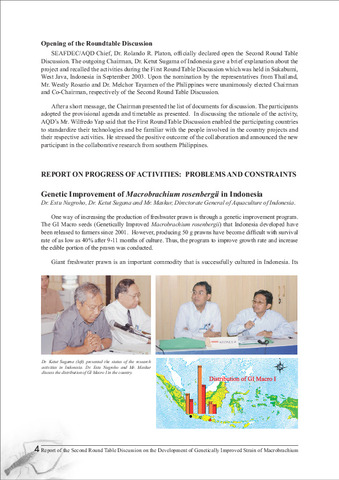Genetic improvement of Macrobrachium rosenbergii in Indonesia.
- Global styles
- MLA
- Vancouver
- Elsevier - Harvard
- APA
- Help
Share
Abstract
One way of increasing the production of freshwater prawn is through a genetic improvement program. The GI Macro seeds (Genetically Improved Macrobrachium rosenbergii) that Indonesia developed have been released to farmers since 2001. However, producing 50 g prawns have become difficult with survival rate of as low as 40% after 9-11 months of culture. Thus, the program to improve growth rate and increase the edible portion of the prawn was conducted.
Giant freshwater prawn is an important commodity that is successfully cultured in Indonesia. Its culture has been developed in several areas of West Java, i.e., Ciamis (Tambaksari, Pamarican and Kalipucang) and Tasikmalaya. The Indonesian Government has developed a hatchery in Jogjakarta province (Central Java), while the private sector control about seven hatcheries. In East Java, freshwater prawn is cultured in brackishwater ponds. Freshwater prawn culture has also spread to some areas of Bali Island, e.g., in Gianyar, Klungkung, Buleleng and Tabanan.
Indonesia has been recognized as the center of origin of the giant freshwater prawn because about 19 identified species are found in almost all islands of the country (Holthuis, 1980). However, this genetic resource is not yet fully used in freshwater prawn culture. Although freshwater prawn culture has been widely developed in Indonesia, some problems have been encountered, e.g., declining growth rate, disease, and the small edible portion (abdominal muscle).
In recent years, the Government of Indonesia has stressed the need to increase the production of freshwater prawn. One way to increase production is through the genetic improvement program. In 2001, the GI Macro (Genetically Improved Macrobrachium rosenbergii), strain of freshwater prawn has been developed and released to farmers.
Type
Meeting report


